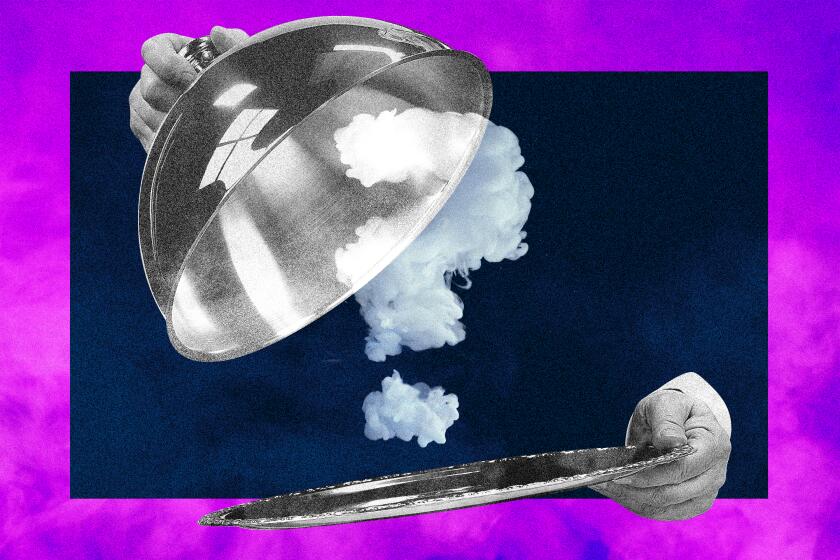Marijuana-- Where There’s Smoke ...
It is interesting to note how many presidential candidates have admitted smoking marijuana in the wake of Judge Douglas Ginsburg’s withdrawal as a nominee to the Supreme Court. It is interesting to note that they all say they would not now indulge because they realize that smoking pot is against the law. They did not mention that marijuana can cause both mental and physical problems.
The active ingredient in marijuana is delta-9-tetrahydrocannabinol (usually abbreviated to THC). It is found in the resin that covers the top leaves and flowers of the hemp plant, which is named cannabis. These leaves and flowers are ground up and smoked in cigarettes.
The effects of marijuana smoking last from two to four hours. Mentally the smoker usually feels calm, a mild high in which time slows down and there is an enhanced sensitivity to sight, sound and touch. Visual perceptions may undergo changes. Reaction time is slowed and there is impairment of attention and coordination.
Physically there is an increase in heart beat and appetite. If several cigarettes are smoked, loss of coordination and disorientation plus confusion, agitation, sometimes hallucinations, may take place.
One reaction that may be encountered by first-time marijuana smokers is acute anxiety. In this state, panic could develop, the smoker thinks he or she is going insane and that companions are ploting against him or her. There is considerable controversy as to whether this is a psychotic reaction or just intensified feelings.
Martin Snyder, Ph.D., division research director at the National Institute of Drug Abuse in Rockville, Md., cautions that animal studies can demonstrate that marijuana may have a negative effect on learning and memory. Chronic use could cause changes in the brain similar to those caused by aging.
Women in particular should be aware of the fact that smoking marijuana while pregnant can lead to birth defects. Marijuana can also be transmitted to the baby via its mother’s milk.
There are some disagreements whether excessive marijuana lowers the level of testosterone in men, causing impotence.
Marijuana use has been declining among young people since the late 1970s. In 1978, 37% of high school seniors indicated they had smoked pot during the previous month and 11% claimed they used it every day, according to the Harvard School of Public Health. In a similar survey in 1986, the number of high school seniors who claimed they had smoked pot during the previous month fell to 23% and those using it daily dropped to 4%. In 1978 poll, 65% of high school students indicted disapproval of marijuana and in 1985, 85% disapproved.
Question: I object strenuously to statements in your recent column that generic drugs are as safe and effective as brand name drugs. The large pharmaceutical companies spend millions of dollars just to bring out one new drug. How can you possibly conclude that generic drugs, which are copies of brand name drugs, are just as good?
Answer: I do not disagree with you that brand-name drug manufacturers spend millions of dollars to research and develop new drugs. These manufacturers receive at least 17 years of patent protection, which prevents any company from marketing the drug as a generic. Once the patent expires, it is legal to make and sell copies of the drug. However, data must be submitted by the generic drug manufacturer to the Food and Drug Administration indicating that the generic copy of the drug is chemically and biologically equivalent to the brand-name drug.
Q: I have athlete’s foot, which I picked up at a local gym where I work out. I hear advertisements for a product called Mike that sounds like a miracle cure. Is it that good and is it without side effects?
A: The product you refer to has the trade name of Micatin and I think the ads may refer to it as Mike. Actually, the drug is miconazole. It is an antifungal drug and is effective for athlete’s foot. Skin reactions are the most common side effects in a small number of people. These include irritation and burning. If these reactions develop, the product should not be used. The safety of this product for use during pregnancy has not been established. Since people with diabetes are more prone to develop skin infections in the legs and feet, the product should not be used without the direction of a physician.
Q: I would like to have your opinion of the Compassionate Pain Relief Act, in both Houses of Congress, to legalize the use of heroin for intractable pain from severe conditions such as cancer.
A: I would be first in line to endorse such bills if they have any scientific merit, but they do not. Heroin will not relieve intractable pain any more than morphine, the narcotic currently prescribed for such pain.
More to Read
Get the L.A. Times Politics newsletter
Deeply reported insights into legislation, politics and policy from Sacramento, Washington and beyond. In your inbox three times per week.
You may occasionally receive promotional content from the Los Angeles Times.






